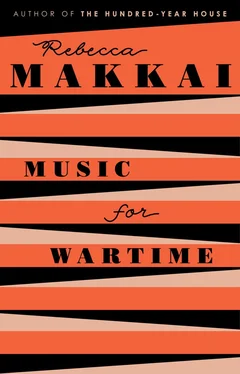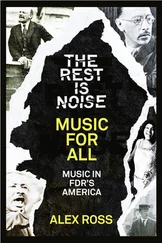But that changed two years ago, when they all went to West Germany before his father’s concert in Bonn. It was the closest Aaron had ever been to Romania, though now that things were suddenly different his father promised a trip before the year was out. As they pulled their luggage through the streets of Bonn, jet-lagged, Aaron had felt a spook, a chill, something that made him want to run, and, half-asleep, almost dreaming, he dropped his backpack to break off around the corner and down an alley until he came to a kind of park. He couldn’t feel his legs. He had run toward the chill, he realized, not away from it. He did not picture dead bodies, he did not see ghosts or hear voices, but he felt something terrible and haunted, the skin-crawl of being alone in a house and pressing your back to the wall so nothing can get behind you. When his father caught him hard by the arm and asked what he was doing, Aaron said, “This is where all the people died.” He didn’t mean it, didn’t believe it, but these words were the only way he could express his strange nausea, the feeling that he was surrounded by graves. His eyes must have looked scared and honest enough, because when they finally found the hotel, his mother asked the old, long-nosed concierge the history of the square. “Yes, yes, there was a synagogue,” he said. “A terrible massacre. This is 1096, almost a thousand years.” And his parents looked at each other, and his father said something in German to the concierge, and his mother’s face became lighter than her hair. Aaron was as shocked as his parents, and he spent the rest of the trip wondering whether this was luck, maybe inherited from his father, or a real vision he just hadn’t known enough to trust fully.
He tried every day now to focus on the things he felt but couldn’t see. It made him even odder to his classmates, he knew, the way he’d sometimes close his eyes in history class, concentrating. He tried to sit in the back row whenever he could. It was people’s sadness, mostly, that he attempted to feel, the ghosts that surrounded them, the place where a finger used to be but no longer was. He imagined pain traveling through the air on radio waves. If he positioned himself in a room and concentrated and listened, he could catch it all.
Since then, his father had not belittled his fevers or broken bones. Aaron knew his father suspected that he was haunted, that he saw ghosts and fires and the evils of the world, past, present, future. He would ask Aaron sometimes what he was thinking, wait for the answer with squeezed eyebrows. He would sit by his bed on nights Aaron couldn’t sleep.
But Aaron was half a liar. When he felt something — for instance, that a woman on the train was sick — he wouldn’t say it aloud until later, when there was no way his parents could ask if she needed help. It was something his mother would probably do, go up to a stranger like that. Most times, he never found out himself whether he was right or wrong. And he didn’t want to know, because if he were wrong even once or twice he’d stop trusting himself. For the same reason, when his father asked him for lottery numbers, he just shook his head. “But think!” his father would say. “With my luck and your psychic powers!” It was the only time he joked about it. When he told the story of Bonn at parties, as he had tonight, it was with reverence. He called Aaron “our little rabbi,” but he wasn’t poking fun.
The six best things about parties were: (1) having so many people to spy on; (2) the job of opening the door for guests and waiting for the curbs to fill with parked cars until yours was the house everyone passed and said, “Oh, they must be having a party tonight!” (3) pastries; (4) the old Romanian men who always brought chocolates, including ones filled with coconut; (5) watching people get drunk and seeing if any ladies tripped in their high heels; and (6) the music.
Radelescu stopped, and people clapped. Aaron decided to pay more attention to the next piece, to follow the music itself rather than what it made him think of. This might be impossible, he knew, to hear only the notes and not daydream or invent pictures. Aaron owed the habit to his first violin teacher, Mrs. Takebe, who insisted that every piece tells a story. As he practiced, he invented quite elaborate ones: One sonata was about a Chinese spy. Another told of a man who had lost his wife in an art gallery and spent the rest of his life looking for her hidden in the paintings.
Aaron knew that no one in the room, least of all himself, could listen without dwelling on Radelescu’s missing finger, on how he’d almost starved to death, on how he’d kept his arms strong in prison. And so a minute in, he gave up focusing on the music alone. Instead he willed himself to feel, more than anyone else in the room, the old man’s memory. This piece will tell the story of his life , he decided, and he tried to understand each note as a separate moment, to hear the thoughts Radelescu himself pulled into them.
Aaron’s father had told him about the university in Iaşi, the oldest in Romania, where the young Radelescu had taught only two semesters before quitting in a rage, setting up his own studio in a decrepit two-story building behind campus. He’d brought many students with him, including Aaron’s father, who secretly left the university grounds for lessons three times a week. Soon a piano teacher joined him, and the place was full of music. Wherever in the thin-walled building you took your violin, you could still hear the piano. And so the two teachers began to specialize in duets, because what else could you do? Aaron imagined that the building smelled old, that mildewed rugs covered the floors, but that the piano was impeccably tuned. His father had always spoken of the two teachers in one breath: Radelescu and Morgenstern and their famous music factory. Morgenstern, he said, had fingers like tree branches and legs like a stick insect’s. When he reached for notes, the piano looked as small as a child’s tin keyboard. Next to Radelescu’s old records on the shelves were several of Morgenstern’s: 1965, 1972, 1980, 1986. Aaron liked flipping through the jackets in chronological order to watch the man’s hair go from brown to gray to white and to see his jowls slowly drop.
The music factory’s star violin student had been Aaron’s father, and on the last day before he set off for America, they’d had a party with a small cake. They must have known there was danger around them. There had been pogroms in other Romanian towns. Aaron imagined a stack of newspapers sitting on the lid of the piano, largely ignored. They might have put the little cake right on top of the papers. They might have said, “Be careful on your journey.” No one would need to say why.
The piece ended — softly — before Aaron could continue the story. No one clapped this time. They sighed and nodded and closed their eyes. Aaron hoped the next piece would be full of noise and minor keys so he could feel how Iaşi had turned on itself, how the Iron Guard had rampaged for nine days through the town, finding every Jew. It was worse than Nazis, because these were people they had trusted. Some of Radelescu’s old students would have been among them. Aaron could not picture the Guard without imagining men in suits of armor, even though his father had corrected this notion long ago.
But the next piece was quiet and tense, and so instead Aaron imagined the inside of the music school, where, when the pogrom began, Radelescu, Morgenstern, and six students barricaded themselves. Four of the students were Jewish. Both teachers were. Around him in the room, Aaron felt the swaying of the forty-two people who were not Radelescu, and he felt them try to imagine his time in the little room. They would be wrong.
Radelescu’s hair would have been wavy still, but black and thick, catching the light of the building’s scattered bulbs. Aaron imagined the musicians would have chosen one single room, the one with the piano, and although the entrances to the building were locked, they would have locked this other, smaller door too, in case the Iron Guard broke through the first barrier. They would have moved the piano up against the door. In here they were safe. Since the building was stone, they might even survive a fire. And since their little school was new and unmarked, almost entirely unknown, perhaps the Guard would not think to batter down the doors and shoot through the windows and douse the porch with gas. Aaron knew from what Radelescu told his father that the eight of them survived on only the small, sour candies Radelescu kept in a bowl on his desk. Aaron did not know whether there was running water. There must have been, because humans do not survive for ten days with no water.
Читать дальше












